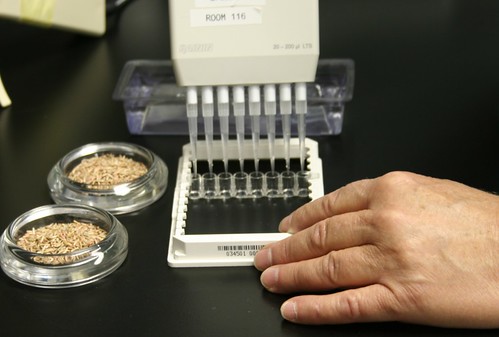
Before the late 1800’s, there weren’t any standards or laws overseeing the seed trade. This allowed individuals to take advantage of the unorganized seed market by selling low quality seed to buyers. In some instances, what was sold wasn’t even seed at all.
Unfortunately, even the most seasoned seed buyers can’t always tell what they will get when purchasing seed. Will the seed grow? If it does grow, what will it grow into? Will these seeds contain a disease that will hurt my other crops? Will the packet contain other unwanted weeds that will reduce my yield, hurt my animals, or destroy my land? The worst part is that the outcome of your purchase won’t be known for months after you buy and “try” to grow them. In the late 1800’s, these questions asked by millions of people around the world led to the rapid development of laboratories tasked with using science to predict seed quality.
In the United States, the Federal Seed Act (FSA), administered by the Agricultural Marketing Service’s Livestock, Poultry and Seed Program, regulates the interstate shipment of agricultural and vegetable seeds. The FSA requires that seed shipped in interstate commerce be labeled with information that allows seed buyers to make informed choices. It ensures that seed labeling information and advertisements are truthful. It also promotes uniformity among State laws and fair competition within the seed trade.
Seed quality equates to crop stand, yield, and overall value. High quality seeds provide the foundation for meeting our food, medical and housing needs. With increased recognition of the importance of seed testing by governments around the world in the late 1800’s, countries begin to experience larger crop yields, increased variety development and stable market prices. Today, virtually all of the world’s population depends on seeds, or the plants they develop into, to carry out functions of daily life.
Seed testing is the only reliable way to predict what will emerge post planting. Fortunately, for the home gardener or hobbyist, almost all of the seed purchased from retail stores are obtained from seed dealers that have already had the seed tested. Results of laboratory test are required to be listed on the packaging labels which must include germination, purity, noxious-weed seed and other information required by the Federal Seed Act and State laws.
If you buy vegetable or agricultural seed that does not reflect what the label promises, you should contact your State department of agriculture’s Seed Control Official (SCO). If they determine that the seed does not accurately reflect what is represented on the label and that it was shipped in interstate commerce, the SCO will forward the sample to the Seed Regulatory and Testing Division (SRTD) for further investigation and testing.
Seed testing experts have the ability to examine the most obscure physical seed characteristics and unlocking other hidden secrets at the protein and genetic levels. These tests offers a reliable forecast for the seed buyer and a cheap insurance policy to hedge against large financial losses related to land, labor, transportation, and chemicals. Seed testing laboratories, State and Federal regulatory agencies and domestic and international seed testing organizations, work in concert and play an important role in maintaining the stability of the seed industry in the United States and around the world. These businesses and organizations consistently research and discover new and reliable testing methods to determine the value of their seed lots.
USDA’s Seed Regulatory and Testing Division is one such laboratory that offers fee-based seed testing services to the seed industry. For more information, please visit www.ams.usda.gov/seed.
